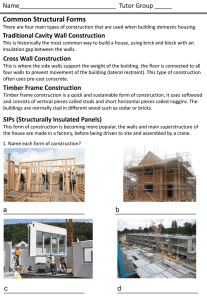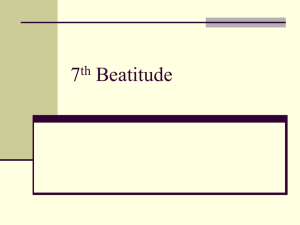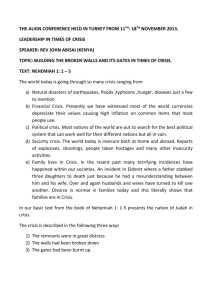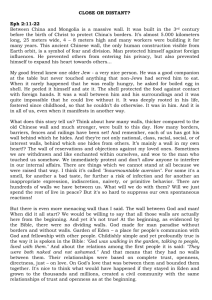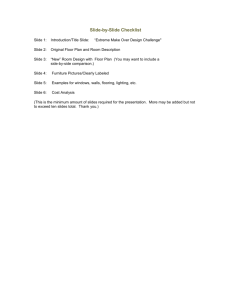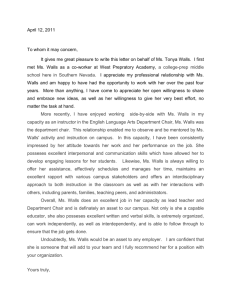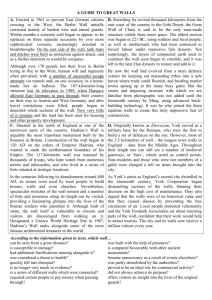A Beautiful Peace - Big Idea Resources
advertisement
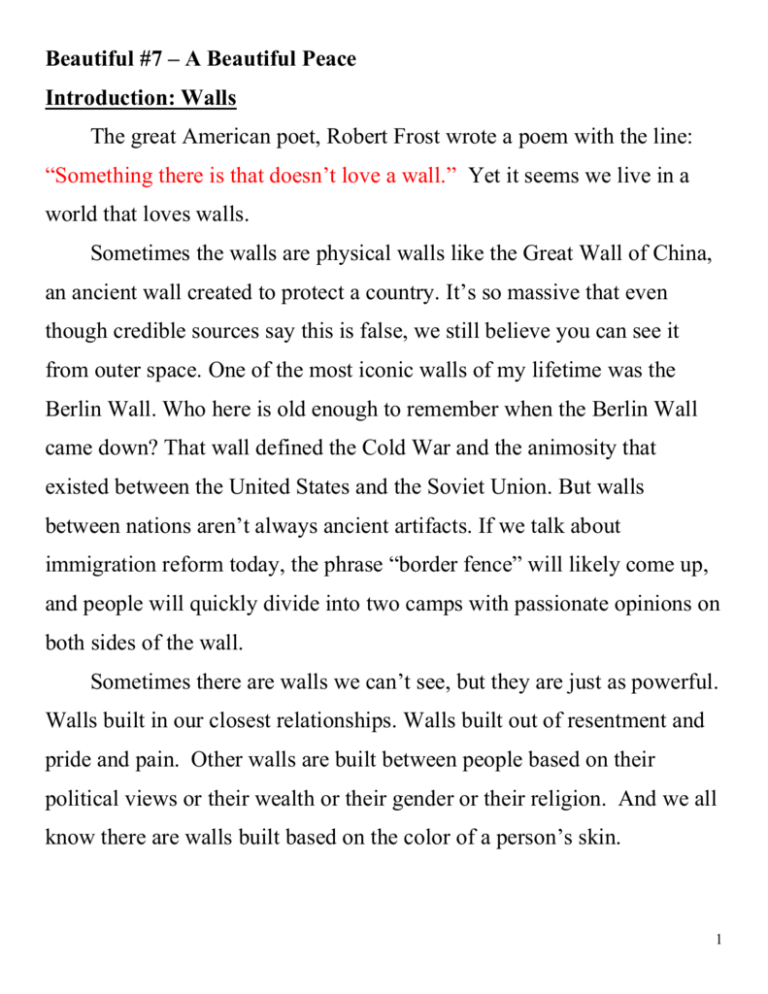
Beautiful #7 – A Beautiful Peace Introduction: Walls The great American poet, Robert Frost wrote a poem with the line: “Something there is that doesn’t love a wall.” Yet it seems we live in a world that loves walls. Sometimes the walls are physical walls like the Great Wall of China, an ancient wall created to protect a country. It’s so massive that even though credible sources say this is false, we still believe you can see it from outer space. One of the most iconic walls of my lifetime was the Berlin Wall. Who here is old enough to remember when the Berlin Wall came down? That wall defined the Cold War and the animosity that existed between the United States and the Soviet Union. But walls between nations aren’t always ancient artifacts. If we talk about immigration reform today, the phrase “border fence” will likely come up, and people will quickly divide into two camps with passionate opinions on both sides of the wall. Sometimes there are walls we can’t see, but they are just as powerful. Walls built in our closest relationships. Walls built out of resentment and pride and pain. Other walls are built between people based on their political views or their wealth or their gender or their religion. And we all know there are walls built based on the color of a person’s skin. 1 There are so many walls of so many kinds, it’s like we live in a world of walls. But still, I think Robert Frost was right: “Something there is that doesn’t love a wall.” Blessed are the Peacemakers Jesus was no lover of walls, and he calls us to reject walls too. We’re nearing the end of our series called “Beautiful” where we’ve been looking at 8 surprising statements Jesus made, statements we refer to as the Beatitudes. And today we’re looking at the 7th of the 8 statements where Jesus declares: “Blessed are the peacemakers, for they will be called children of God.” (Matthew 5:9 NIV) When Jesus spoke of peacemakers, he was talking about people who work to bring down walls. He was saying, “Blessed are the people who do everything in their power to bring down the walls that divide and separate us from one another.” “Something there is that doesn’t love a wall.” You see, in each and every situation where there’s conflict, we’re either a wall-maker or a wall-breaker. And blessed are the people who break down the walls. The Walls We Make The truth is, we all are wall-makers at times. Most of us in our wallmaking are not building walls because we want to aggressively conquer or 2 hurt anyone. Most of our walls are built because we believe that a wall HAS to be built in order to protect ourselves and our interests. So we do things, some times little things, at times pretty big things, and we tell ourselves we’re just protecting ourselves and our interests, that we’re doing what we have to do. A lot of the walls we make are made of words. Winston Churchill had a political adversary, a woman named Nancy Astor, who was the first female member of Parliament. She said to him one time, "Winston, if you were my husband, I’d put poison in your coffee." And Churchill responded, "Nancy, if you were my wife, I’d drink it.” Well played, Mr. Churchill. That is something I would have thought of 3 hours later, and while it is very funny, it was a wall, a wall that was no joke, a wall built between two people. We do the same thing, don’t we? We make walls with our words, and then we tell ourselves we just said what we needed to say to defend ourselves or to make our point. But it the end, it’s just a wall. Sometimes we make walls out of stone-cold silence. A man and wife were giving each other an extended dose of the silent treatment, and a few days into it, the man had an early business flight. He realized that he needed his wife to wake him at 5:00 AM because he often slept right through the alarm. Not wanting to be the first to break the silence, he wrote her a note and left it by the bed: "Please wake me at 5:00 AM.” The next morning he wakes up, and it’s 9 o’clock. First, he’s furious that his 3 wife had ignored his request. Then, he finds a note beside the bed. It said, "It’s 5:00 AM. Wake up." I (Dave Richa) can totally relate to this kind of wall making, especially with my wife, where I don’t enter into the danger of a healthy conflict, but instead fall into the wall-making trap of using silence, or what some might call “pouting” to get my point across. See many of the wall-making things we do, whether it’s in our marriages, our families, our neighborhoods, our workplaces; we think we’re putting up the wall because of what someone else did. We tell ourselves we are just protecting ourselves. We might even feel wise for doing so. But James, the brother of Jesus, gives us a different take on our wall-making. He says:“What causes fights and quarrels among you? Don’t they come from your desires that battle within you? You desire but do not have…” (James 4:1-2a NIV) James is saying, “Get real! You put up walls because you’re mad that you aren’t getting what you want.” In every situation where there’s conflict, we’re either a wall-maker or a wallbreaker. And blessed are the people who break down the walls. Peacekeeping does not Mean Peacemaking (On screen: Matthew 5:9) Peace was a power-packed word in Jesus’ culture. It was the word “shalom,” which means “wholeness, goodness, the way God intended things to be.” If we really want to understand what Jesus is saying to us about being wall-breakers, we need to be careful that 4 we don’t mistake peacemaking for something that can look like an attempt at peace, but it’s not peacemaking. I’m talking about peacekeeping. How many of you watched the World Cup this summer? I know soccer is not a big sport in America, but if you watched the World Cup at all, you can tell that the soccer fans throughout the world are crazy! In fact, in some European soccer stadiums they often put up these huge metal fences to keep the fans of one team away from the fans of the other because over the years, literally hundreds of soccer fans have been injured or killed in brawls between fans of opposing teams. The fences don’t do anything to bring about ‘shalom,’ the wholeness that Jesus was talking about. They don’t change the fact that people are willing to get drunk and beat each other to death over a game. The soccer fences are all about peacekeeping, not peacemaking. And we can mistake peacekeeping for peacemaking in our own lives as well. The classic example is the spouse or parent of an addict who covers for the addict’s behavior, downplays it, or denies it all together. Covering it up may keep the ruckus down, but minimizing the ruckus isn’t peacemaking, it’s peacekeeping. A father has a rebellious teen-age daughter who is pushing him to the limits. A wife has a husband who is physically or emotionally abusive. A co-worker is a bully in the office. We can try to just placate, try to limit the open conflict so they don’t act worse, all the time telling ourselves that we are just trying to keep the peace. But peacekeeping can actually be 5 wall-making because behind the walls of silence and denial, there is no real peace. Behind that wall, the problem only worsens. Peacekeeping is actually wall-making because it walls out the possibility of any real change. Jesus never said, “Blessed are the peacekeepers.” He said, “Blessed are the peacemakers,” the wall-breakers, because “Something there is that doesn’t love a wall.” Temple Example When Jesus said, “Blessed are the peacemakers,” he was talking about breaking down the walls that exist between people not just so that hostility can cease but so that true peace, the shalom peace of God, can be realized. In ancient Israel we find a fascinating example of wall-making and see Jesus Himself as the great wall-breaker. I’m talking about the temple that was at the center of the worship of God in Jesus’ time, the temple in Jerusalem. The temple was really a building comprised of concentric walls, and there were very strict rules about who was allowed beyond certain walls and who wasn’t. 6 They called them “courts,” but they were really walled-off areas. The first wall was called the Court of Gentiles. If you weren’t a Jew, you could worship in here, but you couldn’t go any farther. The second wall was inside that one and it was called the Court of Women. If you were a Jew, you could go into the court of women to worship, but if you weren’t a male Jew, you couldn’t go any farther. Beyond this was a walled-off area called the Court of the Israelites, which of course meant male Israelites. If you were a male Jew, you were allowed in this area, but not beyond it unless you were a priest. If you were a priest, you could enter another walled off area called the Court of Priests. And inside the court of priests was another court, called the Holy Place. Only certain priests were allowed into the Holy Place to worship. And within the Holy Place was another walled off area, called the Holy of Holies. And only one person, the High Priest, was allowed to go in there, just once a year. The wall was actually this huge curtain that hung from floor to ceiling. Even God was kept behind a wall, or believed to be kept behind a wall, in the Holy of Holies. The temple had walls based on race, gender and religious standards. But, “Something there is that doesn’t love a wall.” Jesus’ whole life was about breaking down the walls represented by the temple. He reached-out to the Gentiles that no self-respecting Jew would go near. 7 He interacted with women that male Jews didn’t even acknowledge were present. He gave no special preference to the religious elite, the ones who were considered more holy than the rest. In fact, he attacked the walls that separated them from ordinary people because the religious leaders were no more special in God’s eyes than anybody else. Jesus spent his whole life wall-breaking wherever he went. And check this out… You know that curtain that kept people walled off from God in the Holy of Holies? Look at what happened when Jesus died: “At that moment the curtain of the temple was torn in two from top to bottom.” (Matthew 27:51 NIV) Can you see the significance of that? It meant Jesus was breaking down all walls: not just between people and people, but between people and God. The Apostle Paul said of Jesus: “For Christ himself has brought peace to us. He united Jews and Gentiles into one people when, in his own body on the cross, he broke down the wall of hostility that separated us… He brought this Good News of peace to you Gentiles who were far away from him, and peace to the Jews who were near. Now all of us can come to the Father through the same Holy Spirit because of what Christ has done for us. (Eph. 2:14, 17-18 NLT) Jesus was a peacemaker. And as his followers, we are called to be peacemakers too. We are called to be wall-breakers because peacemakers are not OK with walls. In fact, they hate them! 8 So do you want to know what grieves the heart of God? When his people do the whole wall-making thing just like everybody else. Christians down through the ages have refused the blessedness of peacemaking and have instead tolerated and perpetuated sexism, racism, and classism. Too often we have been wall-making when we should have been wall-breaking. So the question for us today is we will embrace this blessing of committing our lives to Christ-following peacemaking? “Something there is that doesn’t love a wall.” 4 Areas of Peacemaking So where do we need to be peacemakers, to break down walls that we have allowed to stand for too long? #1 is Between Us and God. This is the most crucial wall that must come down in our lives, the wall built between us and God. (On screen:“As for you, you were dead in your transgressions and sins…” (Ephesians 2:1 NIV) Our sin, anything we do that is against the will of God, builds a wall between us and him. Sometimes we don’t recognize the wall that’s between us and God. We think, “I’m a pretty good person, I help others when I can, I give some money to charity, I go to church.” But understand, none of that breaks down the wall of sin between us and God. Our sin separates us from him, and there is nothing we can do on our own to bring down this wall. (On screen: “But because of his great love for us, God, who is rich in mercy, made us alive with Christ even when we were dead in 9 transgressions—it is by grace you have been saved. (Ephesians 2:4-5 NIV)) But God, in Jesus, steps in and does for us what we cannot do. His sacrifice on our behalf tears down the wall that separates us from God. To find our way back to him, all we need to do is confess our sin and receive what God has done for us through Jesus. Friends, maybe for you, today is the day where you need to say, “I have created a wall by my own sin, and I cannot bring down that wall on my own. Jesus, do for me what only you can do.” That’s area #1. The second wall breaking area may be Between Me and Others. Many of us have built walls between ourselves and other people. Maybe a parent. Maybe a spouse or ex. Maybe a son or daughter. Maybe someone you once called a close friend. What exists between you is a wall of resentment and hostility and bitterness, or maybe by now it’s cooled down to the most counterfeit peace of all, indifference. But it’s a wall. And “Something there is that doesn’t love a wall.” I don’t know who it is, but chances are we all have a wall up against someone. And I believe the Spirit of Christ is here right now speaking to our hearts saying, “Break down that wall.” It’s some risky stuff, isn’t it? There are no guarantees the peacemaking efforts on our part will work. But hear the voice of the Apostle Paul as he urges: “If it is possible, as far as it depends on you, live at peace with everyone.” (Romans 12:18 NIV) Maybe you’re thinking: 10 “I’ve already tried with this person, why keeping beating my head against the wall?” Look at what the blessing of peacemaking is: “Blessed are the peacemakers, for they will be called the sons of God.” (Matthew 5:9 NIV) When Jesus says peacemakers will be called “sons of God,” he is saying we are like our Father in heaven, we are like Jesus, when we choose the hard road of peacemaking. When we break walls. When we work for shalom. It cost Jesus his life to bring peace, but he did it anyway. “Blessed are the peacemakers, for they will be called the sons of God.” #3 is breaking down walls Between Others and Others. Some of us need to work in situations between people for peace, between family members and family members, between co-workers and co-workers. You might be where you are for a reason. Blessed are the peacemakers who try to bring peace between people who have built walls. And #4 is breaking down walls Between Others and God. As Christ-followers and as a church, we need to remember that this is at the center of who we are called to be, what we are called to do. Helping people find their way back to God is the mission of the peacemaker. It’s who we are called to be. Isn’t that the legacy we want to leave, to follow in the footsteps of Jesus? To live for the mission of peace he started? “Blessed are the peacemakers, for they will be called the sons of God.” “Something there is that doesn’t love a wall.” 11 Conclusion: Corrie ten Boom’s Prayer I know this can be a hard topic and a HUGE step for many of us. Some of our walls have been built for so long, and have been reinforced over the years by so much pain, that we don’t think they can ever come down. So let’s end with this… As daunting as the call to peacemaking, wall-breaking can be, the good news is that God doesn’t ask us to be peacemakers under our own power. Corrie ten Boom was a woman who a prisoner in a Nazi concentration camp during WWII. She was humiliated and abused by the guards, lost most of her family when they were killed by the Nazis. And after the war, she went all over Europe preaching forgiveness and peace; and one time after she did, a man walked up to her and extended his hand and asked if she would forgive even him. You know who he was: one of the very guards who humiliated and abused her. She says she did not have it in her to even shake his hand; the hurt and hate were so deep. But she says she somehow prayed, “Jesus help me,” and she says it was only the power of God that raised her hand to shake his. So with that in mind, I want to ask everyone to bow their heads, and with your head bowed, I want to pray for us, pray the prayer of Corrie Ten Boom: “Jesus help me…” Sample Prayer: Father, I know that in this room there are a lot of walls built up, walls that have been built up for years, maybe even for 12 decades. And Father, they have been built up over acts that have deeply wounded, and for some of us, forever altered our lives. Father – First, I pray that every person here knows of your deep love for them, a love that can heal, a love that can bring hope, a love that is patient, gentle, and kind. And Father, I pray that we first acknowledge the wall of hostility that we have built up between us and you. There is no way around it; we have sinned against you. We have left our first love, and today, maybe for the first time, we own this wall, and in Jesus’ name and through his power, we ask for this wall to be torn down. Second, Father I pray for the walls that have been built up between us and other people. Father, many of these walls we cannot break down in our own power, and so we echo the words of Corrie Ten Boom, when we pray, “Jesus, help me.” Help me to be a person who brings your peace, who breaks down walls, who allows your peace to flow through me. We pray this all in Jesus’ name – Amen. 13
